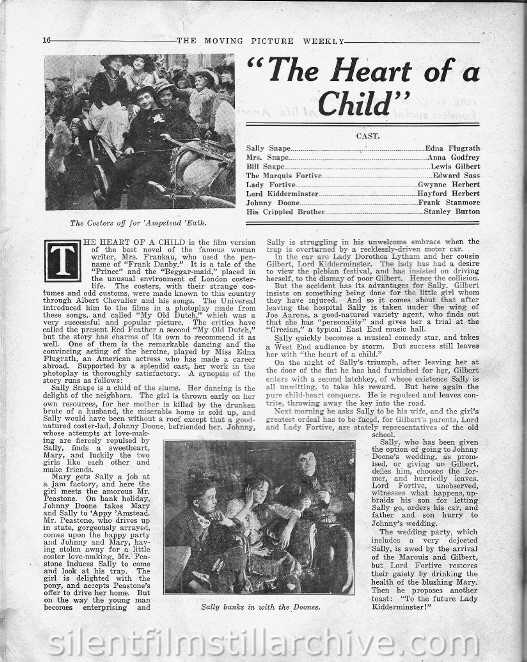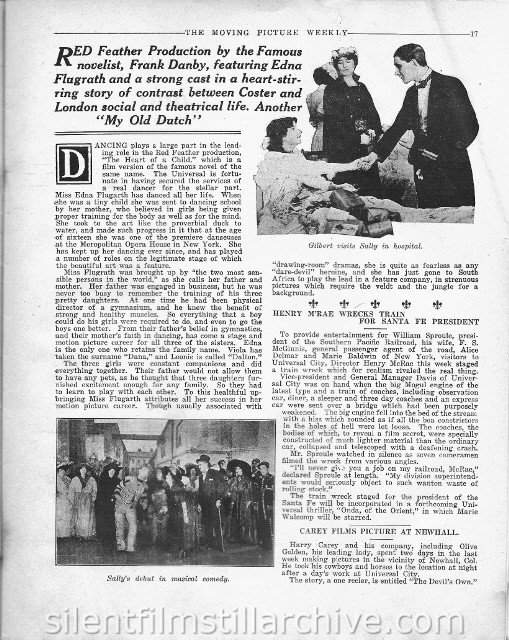![]()

The Heart of a Child (1915)

"The Heart of a Child"
The Costers off for 'Ampstead 'Eath.
CAST
|
Sally Snape |
Edna Flugrath |
|
Mrs. Snape |
Anna Godfrey |
|
Bill Snape |
Lewis Gilbert |
|
The Marquis Fortive |
Edward Saas |
|
Lady Fortive |
Gwynne Herbert |
|
Lord Kidderminster |
Hayford Herbert |
|
Johnny Doone |
Frank Stanmore |
|
His Crippled Brother |
Stanley Burton |
THE HEART OF A CHILD is the film version of the best novel of the famous woman writer, Mrs. Frankau, who used the pen-name of "Frank Danby." It is a tale of the "Prince" and the "Beggar-maid," placed in the unusual environment of London coster-life. The costers, with their strange costumes and odd customs, were made known to this country through Albert Chevalier and his songs. The Universal introduced him to the films in a photoplay made from these songs, and called "My Old Dutch," which was a very successful and popular picture. The Critics have called the present Red Feather a second "My Old Dutch," but the story has charms of its own to recommend it as well. One of them is the remarkable dancing and the convincing acting of the heroine, played by Miss Edna Flugrath, an American actress who has made a career abroad. Supported by a splendid cast, her work in the photoplay is thoroughly satisfactory. A synopsis of the story runs as follows:
Sally Snape is a child of the slums. Her dancing is the delight of the neighbors. The girl is thrown early on her own resources, for her mother is killed by the drunken brute of a husband, the miserable home is sold up, and Sally would have been without a roof except that a good-natured coster-lad, Johnny Doone, befriended her. Johnny, whose attempts at love-making are fiercely repulsed by Sally, finds a sweetheart, Mary, and luckily the two girls like each other and make friends.
Mary gets Sally a job at the jam factory, and here the girl meets the amorous Mr. Peastone. On bank holiday, Johnny Doone takes Mary and Sally to 'Appy 'Ampstead. Mr. Peastone, who drives up in state, gorgeously arrayed, comes upon the happy party and Johnny and Mary, having stolen away for a little coster love-making, Mr. Peastone induces Sally to come and look at his trap. The girl is delighted with the pony, and accepts Peastone's offer to drive her home. But on the way the young man becomes enterprising and Sally is struggling in his unwelcome embrace when the trap is overturned by a recklessly-driven motor car.
In the car are Lady Dorothea Lytham and her cousin Gilbert, Lord Kidderminster. The lady has had a desire to view the plebian festival, and has insisted on driving herself, to the dismay of poor Gilbert. Hence the collision.
But the accident has its advantages for Sally. Gilbert insists on something being done for the little girl whom they have injured. And so it comes about that after leaving the hospital Sally is taken under the wing of Joe Aarons, a good-natured variety agent, who finds out that she has "personality" and gives her a trial at the "Grecian," a typical East End music hall.
Sally quickly becomes a musical comedy star, and takes a West End audience by storm. But success still leaves her with "the heart of a child".
On the night of Sally's triumph, after leaving her at the door of the flat he has had furnished for her, Gilbert enters with a second latchkey, of whose existence Sally is all unwitting, to take his reward. But here again the pure child-heart conquers. He is repulsed and leaves contrite, throwing away the key into the road.
Next morning he asks Sally to be his wife, and the girl's greatest ordeal has to be faced, for Gilbert's parents, Lord and Lady Fortive, are stately representatives of the old school.
Sally, who has been given the option of going to Johnny Doone's wedding, as promised, or giving up Gilbert, defies him, chooses the former, and hurriedly leaves. Lord Fortive, unobserved, witnesses what happens, upbraids his son for letting Sally go, orders his car, and father and son hurry to Johnny's wedding.
The wedding party, which includes a very dejected Sally, is awed by the arrival of the Marquis and Gilbert, but Lord Fortive restores their gaiety by drinking the health of the blushing Mary. Then he proposes another toast: "To the future Lady Kidderminster!"

RED Feather Production by the Famous novelist, Frank Danby, featuring Edna Flugrath and a strong cast in a heart-stirring story of constrast between Coster and London social and theatrical life. Another "My Old Dutch"
DANCING plays a large part in the leading role in the Red Feather production, "The Heart of a Child," which is a film version of the famous novel of the same name. The Universal is fortunate in having secured the services of a real dancer for the stellar part. Miss Edna Flugarth (sic) has danced all her life. When she was a tiny child she was sent to dancing school by her mother, who believed in girls being given proper training for the body as well as for the mind. She took to the art like the proverbial duck to water, and made such progress init that at the age of sixteen she was one of the premiere danseuses at the Meropolitan (sec) Opera House of New York. She has kept up her dancing ever since, and has played a number of roles on the legitimate stage of which the beautiful art was a feature.
Miss Flugrath was brought up by "the two most sensible persons in the world," as she calls her father and mother. Her father was engaged in business, but he was never too busy to remember the training of his three pretty daughters. At one time he had been physical director of a gymnasium, and he knew the benefit of strong and healthy muscles. So everything that a boy could do his girls were required to do, and even to go the boys one better. From their father's belief in gymnastics, and their mother's faith in dancing, has come a stage and motion picture career for all three of the sisters. Edna is the only one who retains the family name. Viola has taken the surname "Dana," and Leonie is called "Dalton."
The three girls were constant companions and did everything together. Their father would not allow them to have any pets, as he thought that three daughters furnished excitement enough for any family. So they had to learn to play with each other. To this healthful upbringing Miss Flugarth (sic) attributes all her success in her motion picture career. Though usually associated with "drawing-room" dramas, she is quite as fearless as any "dare-devil" heroine, and she has just gone to South Africa to play the lead in a feature company, in strenuous pictures which require the veldt and jungle for a background
From The Moving Picture Weekly, July 8, 1916, pages 16-17
with Edna Flugrath and Edward Sass. Directed by Harold M. Shaw. London Films (Universal).
More Information on this film...

This work (The Heart of a Child (1916),
by London
Films/Universal), identified by
Bruce Calvert, is free of known copyright
restrictions.
Books
(none)
Last Modified May 5, 2012.



















